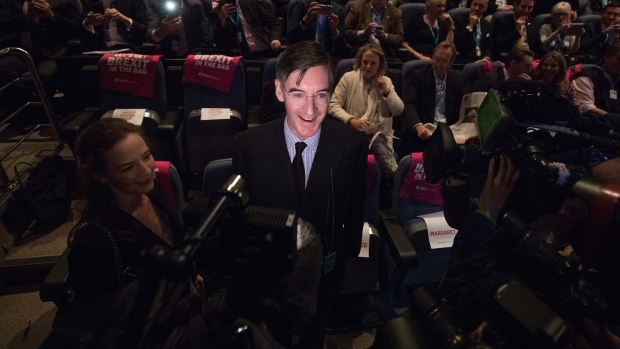Nov 19, 2018
Jacob Rees-Mogg Turns Brexit Britain into Italy
, Bloomberg News

(Bloomberg Opinion) -- Arch-Brexiter Jacob Rees-Mogg once described the euro as “the acme of failure.” Unfortunately for him, his crusade against Prime Minister Theresa May and her deal to exit the European Union is prompting some to compare Britain with Italy, one of the euro area's slowest-growing economies and source of market stress.
BNP Paribas SA Chairman Jean Lemierre told a banking conference in Frankfurt last week that Brexit is a bigger risk than Italy. That may sound sensationalist – even a Britain on the brink of exiting the EU has a lower risk of default on its debt than Rome. But he has a point.
Italy's populist leaders are taking on Brussels with deficit-busting budget plans, yet they have at least repeatedly ruled out leaving the euro and acknowledged the need to satisfy the gentlemen of the spread – the traders who sell Italian government debt on every hawkish pronouncement. This has helped to stop the contagion in Italy spreading to the rest of the euro zone.
The backlash in Britain against May's 560-page draft deal, meanwhile, looks anything but contained. It has heightened the risk of an even worse outcome than the sub-optimal deal agreed with Brussels – the biggest of all being a no-deal Brexit.
That has prompted selling pressure from what an Italian might dub the gentlemen of the pound. Last week's cabinet resignations over May's deal saw sentiment on sterling turn the most bearish since the aftermath of the Brexit referendum in 2016.
A rejection of the deal by parliament could mean all sorts of outcomes – a leadership challenge, a snap election, a new referendum. All they do for sure is bring the U.K. closer to the March 2019 deadline for leaving without a politically acceptable deal in place.
This uncertainty, expressed in the pound volatility gauge, matters not just for the domestic economy, but also for foreign companies and investors whose cash helps fund Britain's current-account deficit.
The similarity with Italy, though, runs even deeper: Brexit marks a shift away from pragmatism in the country's politics and its carefully cultivated image as a safe haven toward something more extreme.
The terms of May's deal may be bad relative to what U.K.-based firms enjoy today; they look positively benign compared with the possible alternatives.
What are the alternative Brexit visions on offer? May's foes within the Conservative party are offering Singapore-on-Thames. Dominic Raab, one of the favorite to replace her, recently said the U.K. could cut corporation tax to as little as 10 percent from 19 percent today. Such a race to the bottom would be risky, going up against U.S. President Donald Trump's own tax-slashing tactics, and would potentially blow a hole in the public finances. This isn't a Brexit for the common man.
Besides, the inconvenient truth is that the favorite to be the next U.K. Prime Minister isn't Rees-Mogg or Raab, but the leader of the opposition Labour party, Jeremy Corbyn. His political vision resembles Cuba without the sun. Re-nationalizations, wealth taxes, and lifting corporation tax to as much as 26 percent are measures the average company might find less than endearing.
Bar a reversal of Brexit, a rejection of May's deal risks proving Lemierre correct. If a no-deal Brexit takes place, politicians in the U.K. will realize, like their Italian counterparts, that there is a financial price to pay for extremism. By then, though, it will be too late.
To contact the author of this story: Lionel Laurent at llaurent2@bloomberg.net
To contact the editor responsible for this story: Edward Evans at eevans3@bloomberg.net
This column does not necessarily reflect the opinion of the editorial board or Bloomberg LP and its owners.
Lionel Laurent is a Bloomberg Opinion columnist covering finance and markets. He previously worked at Reuters and Forbes.
©2018 Bloomberg L.P.